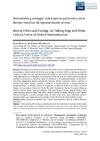Please use this identifier to cite or link to this item:
https://accedacris.ulpgc.es/jspui/handle/10553/42371
| Title: | Animalismo y ecología: sobre perros parlantes y otras formas literarias de representación animal | Other Titles: | Animal ethics and ecology: on talking dogs and other literary forms of animal representation | Authors: | Marrero Henríquez, José Manuel | UNESCO Clasification: | 620202 Análisis literario | Keywords: | Literatura española Ética animal Representación literaria Historia literaria Ecocrítica, et al |
Issue Date: | 2017 | Publisher: | 1989-7383 | Journal: | Castilla Estudios de Literatura | Abstract: | Afectado por el proteccionismo decimonónico y por la reivindicación del bienestar de los animales en tanto sujetos de derecho que emerge en los años 1970 y se asienta por derecho propio en el siglo XXI, este artículo estudia la medida en que la ética animal y el ecologismo contemporáneos se ven reflejados en las diversas formas literarias de representación animal que pueblan la historia de la literatura, desde el Medioevo a la contemporaneidad, en bestiarios, canciones, hagiografías, gestas, espectáculos teatrales, fábulas, coloquios, relatos y poemas: el animal como tópico, motivo, símbolo o metáfora, el animal parlante, el animal-máquina, el animal-decorado, el sintiente, sujeto de compasión, el sujeto de derecho, el volitivo, el moral. Pasajes del cancionero, Poema de Fernán González, Gonzalo de Berceo, Cervantes, Góngora, Benito Jerónimo Feijoo, Francisco González Díaz, Juan Ramón Jiménez, Miguel Delibes, Jesús López Pacheco, Dionisio Cañas, Niall Binns, Serafín Portillo, Fernando Aramburu, José Manuel Marrero Henríquez y Aurelio González Ovies servirán, entre otros, para reflexionar sobre el animal al habla que se agazapa tras las variadas formas literarias de representación animal. Influenced by 19th century protectionism and the vindication of animal welfare rights that emerges in the 1970s and establishes itself as law in the 21st century, this article studies the extent to which contemporary animal ethics and environmentalism are reflected in the various literary forms of animal representation that populate Spanish literary history from the Middle Ages to the contemporary in bestiaries, songs, hagiographies, plays, theatrical shows, fables, colloquiums, stories and poems. These reflections include the animal as topic, motif, symbol or metaphor, the talking animal, animal as machine, and animal as prop, sentient-being, subject of compassion, subject of law, strong-willed, and moral. Excerpts from the cancionero, Poem of Fernan Gonzalez, Gonzalo de Berceo, Cervantes, Gongora, Benito Jeronimo Feijoo, Francisco Gonzalez Diaz, Juan Ramon Jimenez, Miguel Delibes, Jesus Lopez Pacheco, Dionisio Canas, Niall Binns, Serafin Portillo, Fernando Aramburu, Jose Manuel Marrero Henriquez and Aurelio Gonzalez Ovies among others will serve to reflect on the animal whose voice hides behind the various literary forms of animal representation. |
URI: | https://accedacris.ulpgc.es/handle/10553/41504 | ISSN: | 1989-7383 | DOI: | 10.24197/cel.8.2017.258-307 | Source: | Castilla Estudios de Literatura [ISSN 1989-7383], v. 8, p. 258-307 |
| Appears in Collections: | Artículos |
SCOPUSTM
Citations
10
checked on Jun 8, 2025
Page view(s) 5
579
checked on Jan 9, 2026
Download(s)
231
checked on Jan 9, 2026
Google ScholarTM
Check
Altmetric
Share
Export metadata
Items in accedaCRIS are protected by copyright, with all rights reserved, unless otherwise indicated.
